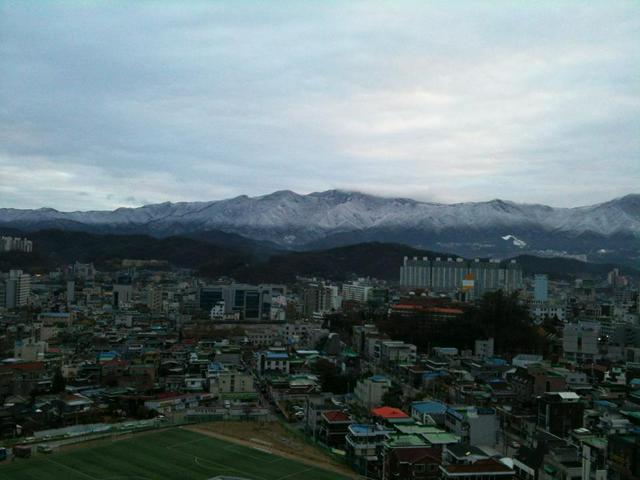 Wonju (원주,原州) is a city in Gangwon.
Wonju (원주,原州) is a city in Gangwon.
Wonju is a modern city of over 300,000 people to the east of Seoul. It was the capital city of the historical Gangwon province during the Joseon Dynasty.
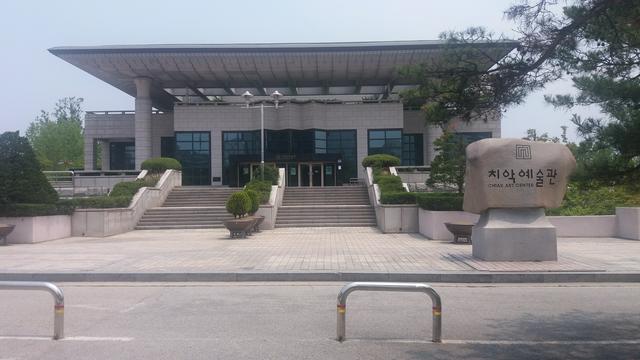
- Sangwonsa Temple, 1060, Seongnam-2ri, Sillim-myeon, Wonju-si, Gangwon-do 강원 원주시 신림면 성남2리 1060번지 (take bus 23 bound for Seongnam-ri (성남리) from Wonju train station or Wonju Intercity Bus Terminal, +82 33-763-5232. Sangwonsa Temple: Sangwonsa Temple preserves Korea's oldest grand temple bell (National Treasure No. 36). Ash remains of the Buddha brought from the Tang Dynasty are embedded at Jeongmyeolbogung in Sangwonsa Temple, singled out as the number-one Buddhist sacred ground in Korea. Free.
- Guryongsa Temple. Guryongsa Temple is intertwined with an interesting legend that in the Silla dynasty, the year 666, nine dragons filled up a pond and built the temple atop. The splendid golden single-story building inside Daeungjeon and Daeungjeon itself were built in the representative architecture of the Joseon dynasty. Korea's largest straw mat is another attraction at Guryongsa Temple.
- Beobcheonsaji temple, 629, beopcheon-ri, buronmyeon, Wonju-si, Gyeonggi-do, Korea, +82 033-733-1330. It is designated as a National Treasure. The area covers 1,338 ㎡. There are no buildings such as the building of the building on the walls of the building. The monument is preserved at seokjjomul Temple Site of 5.54 (hyeonmyotap), which was built in 1085 (beopcheonsaji), jigwanggukssa Temple Site of tappi (jigwang), beopcheonsa (National Treasure No. 20), and seoktapjjae (National Treasure No. 132), which is enshrined in Gyeongbokgung Palace. The Buddhist temple was built during the Goryeo Dynasty, but it was built during the Goryeo Dynasty, a Buddhist temple that flourished during the Goryeo Dynasty.It seems that this year's history was the beginning of the heyday of the school year, which was passed in the early days of the Joseon Dynasty.
Sangwonsa Temple, 1060, Seongnam-2ri, Sillim-myeon, Wonju-si, Gangwon-do 강원 원주시 신림면 성남2리 1060번지 (take bus 23 bound for Seongnam-ri (성남리) from Wonju train station or Wonju Intercity Bus Terminal, +82 33-763-5232. Sangwonsa Temple: Sangwonsa Temple preserves Korea's oldest grand temple bell (National Treasure No. 36). Ash remains of the Buddha brought from the Tang Dynasty are embedded at Jeongmyeolbogung in Sangwonsa Temple, singled out as the number-one Buddhist sacred ground in Korea. Free.
Guryongsa Temple. Guryongsa Temple is intertwined with an interesting legend that in the Silla dynasty, the year 666, nine dragons filled up a pond and built the temple atop. The splendid golden single-story building inside Daeungjeon and Daeungjeon itself were built in the representative architecture of the Joseon dynasty. Korea's largest straw mat is another attraction at Guryongsa Temple.
Beobcheonsaji temple, 629, beopcheon-ri, buronmyeon, Wonju-si, Gyeonggi-do, Korea, +82 033-733-1330. It is designated as a National Treasure. The area covers 1,338 ㎡. There are no buildings such as the building of the building on the walls of the building. The monument is preserved at seokjjomul Temple Site of 5.54 (hyeonmyotap), which was built in 1085 (beopcheonsaji), jigwanggukssa Temple Site of tappi (jigwang), beopcheonsa (National Treasure No. 20), and seoktapjjae (National Treasure No. 132), which is enshrined in Gyeongbokgung Palace. The Buddhist temple was built during the Goryeo Dynasty, but it was built during the Goryeo Dynasty, a Buddhist temple that flourished during the Goryeo Dynasty.It seems that this year's history was the beginning of the heyday of the school year, which was passed in the early days of the Joseon Dynasty.
- Chiak Art Center, 589, Myeongnyun 1-dong, Wonju-si, Gangwon Province, +82 033-763-9114. 660 seats, diverse costumes, lighting facilities, lighting facilities, dayang facilities, and nearby ski resorts are equipped with parking lots. The concert hall is a venue for more than 4,000 seats and events, marking a large-scale outdoor concert hall and large-scale outdoor performances.On the ground floor, regional cultural institutions have established their offices as cultural centers in the area.
- Wonju History Museum, 836-1, Bongsan-dong, +82 033-737-4371. The museum's History Museum exhibits historical attractions, exhibits, historical heritages, historical heritage and historical relics of the ancient Wonju area, which have been collected and preserved throughout the Goryeo Dynasty. Also, various programs such as special exhibition, family movie, movie theater, and movie theater manage various kinds of exhibitions to understand and enjoy our traditional culture and enjoy learning and enjoy enjoy our traditional culture.
- Mureung Museum, 540, Heungeop-myeon, Wonju-si, Gyeonggi-do, Korea, +82 033-763-1535. 09:00-17:00. It is a private museum.Three former teachers of the former priest's elementary school were upgraded.From prehistoric times to modern times, 12,000 different relics are displayed.
- Hanji museum, 151, hanji, +82 033-734-4739. The Wonju theme park is Art hanji Art School. Creating creative education programs such as the arts, crafts, and workshops and workshops will also be available as a venue for exploration of korean paper and training. The works of the authors of high-quality Korean culture will be displayed, and the works of local and national governments, individuals, individuals and organizations will be displayed or displayed.
- Myungjoosa Chiaksan and Engraving Museum, 1706-1, hwangdun, Sillim-myeon, +82-33-761-7885. The breath of thousand years of time lapse at Myungjoo Temple's Woodblock Prints Museum The collections include Korean, Chinese, Japanese, Tibet and Mongolian's old/original woodblockprints with books, patterns and amulets. The number of collections are more than 4,000 pieces.
Chiak Art Center, 589, Myeongnyun 1-dong, Wonju-si, Gangwon Province, +82 033-763-9114. 660 seats, diverse costumes, lighting facilities, lighting facilities, dayang facilities, and nearby ski resorts are equipped with parking lots. The concert hall is a venue for more than 4,000 seats and events, marking a large-scale outdoor concert hall and large-scale outdoor performances.On the ground floor, regional cultural institutions have established their offices as cultural centers in the area.
Wonju History Museum, 836-1, Bongsan-dong, +82 033-737-4371. The museum's History Museum exhibits historical attractions, exhibits, historical heritages, historical heritage and historical relics of the ancient Wonju area, which have been collected and preserved throughout the Goryeo Dynasty. Also, various programs such as special exhibition, family movie, movie theater, and movie theater manage various kinds of exhibitions to understand and enjoy our traditional culture and enjoy learning and enjoy enjoy our traditional culture.
Mureung Museum, 540, Heungeop-myeon, Wonju-si, Gyeonggi-do, Korea, +82 033-763-1535. 09:00-17:00. It is a private museum.Three former teachers of the former priest's elementary school were upgraded.From prehistoric times to modern times, 12,000 different relics are displayed.
Hanji museum, 151, hanji, +82 033-734-4739. The Wonju theme park is Art hanji Art School. Creating creative education programs such as the arts, crafts, and workshops and workshops will also be available as a venue for exploration of korean paper and training. The works of the authors of high-quality Korean culture will be displayed, and the works of local and national governments, individuals, individuals and organizations will be displayed or displayed.
Myungjoosa Chiaksan and Engraving Museum, 1706-1, hwangdun, Sillim-myeon, +82-33-761-7885. The breath of thousand years of time lapse at Myungjoo Temple's Woodblock Prints Museum The collections include Korean, Chinese, Japanese, Tibet and Mongolian's old/original woodblockprints with books, patterns and amulets. The number of collections are more than 4,000 pieces.
- Toji Literature Park, Gangwon-Do, Wonju-si, Toji-gil 1, +82-33-762-6843. 10:00-17:00. Another name of this park is the 'Park Kyongni Literature Park'. Park Kyongni is a famous Korean novelist, and Toji is her most famous book. Toji means a land. Free entry.
- Toji Cultural Park, 570, heungeop-myeon, Wonju-si, Gyeonggi-do, Korea, +82 033-762-1382. It is cultural art space operated by the Cultural Heritage Foundation, and it is a cultural venue for literary and artistic works, and cultural events such as Literature, Park Literature, Reading Ceremony, Reading Ceremony, and Culture Course.
Toji Literature Park, Gangwon-Do, Wonju-si, Toji-gil 1, +82-33-762-6843. 10:00-17:00. Another name of this park is the 'Park Kyongni Literature Park'. Park Kyongni is a famous Korean novelist, and Toji is her most famous book. Toji means a land. Free entry.
Toji Cultural Park, 570, heungeop-myeon, Wonju-si, Gyeonggi-do, Korea, +82 033-762-1382. It is cultural art space operated by the Cultural Heritage Foundation, and it is a cultural venue for literary and artistic works, and cultural events such as Literature, Park Literature, Reading Ceremony, Reading Ceremony, and Culture Course.
- Megabox Wonju, Seowondae-Ro 165-3, +82 15440070. 8 theaters, 902 seats.
- Megabox Wonju-central, Hwanggeum-Ro 2, +82 15440070. 7 theaters, 1039 seats.
- CGV Wonju, Seowondae-Ro 171, +82 15441122. 10 theaters, 1968 seats,
- LotteCinema NamWonju, Seowondae-Ro 396, +82 15448855. 7 theaters, 1196 seats.
- Wonju Youngsang Media Center 'Modu' Theater, +82 33 733 8020. This center has one theater and 121 seats. It is where independent films and art films are mainly shown.
Megabox Wonju, Seowondae-Ro 165-3, +82 15440070. 8 theaters, 902 seats.
Megabox Wonju-central, Hwanggeum-Ro 2, +82 15440070. 7 theaters, 1039 seats.
CGV Wonju, Seowondae-Ro 171, +82 15441122. 10 theaters, 1968 seats,
LotteCinema NamWonju, Seowondae-Ro 396, +82 15448855. 7 theaters, 1196 seats.
Wonju Youngsang Media Center 'Modu' Theater, +82 33 733 8020. This center has one theater and 121 seats. It is where independent films and art films are mainly shown.
- Wonju Children's Day, 170, Dangu-ro, +82 33-737-2773. The event is celebrated with attractions and entertainment that encompass culture and play.
- Lunar New Year's Festival, Maeji, heungeop, +82 033-761-7228. The festival, which hosts the unique folk culture of the local folk culture by restoring the unique folk culture of local folk culture and enhancing pride of local folk culture, has been incorporated into a festival to promote the traditional folk festivities of the town, which is a celebration of the traditional folk culture and celebration of the rite. The guardian deity of the village will enjoy the folk heritage of the traditional folk culture and observe the traditional folk culture and observe the traditional folk culture and observe the traditional folk culture.
- Wonju International Walking Competition, 342, Myeongnyun-dong, +82 033-762-2234. Courses: 5 km, 10 km, 20 km, 30 km, 50 km Qualification : wealthy persons (persons and toddlers) regardless of nationality, age, gender or gender.
Because of the spread of walking exercises, improving national health promotion, fostering healthy body and soul, contributing to the bright and healthy social construction of Korea, contributing to the scenic nature of Korea, and enhancing the nation's scenic beauty and outstanding culture. - Hanji Cultural Festival, Hanji Park Gil 151, +33 033-734-4739. This festival celebrates tradition. Participants in the festival can participate in jeontonggeuk performances such as Hanji, Paper Making, Making Hanji, Making Paper Entertainment, Making Hanji hanji, and Performing a variety of contemporary folk performances including singing and Hanji, and a variety of traditional folk performances including singing and Hanji.
- Rose Festival, Dangyedong 854, +82 033-745-0978. The Rose Festival, which represents the Rose of Wonju, offers visitors a variety of programs to enjoy in the Rose Park at the center of the Rose Garden in downtown Seoul. Among the tens of thousands of colorful rose queens who boast of elegant, elegant, geueuka, and peseutibal performances, the festival features a festival of participatory rock concerts, honor performances, performances, performances, parades, Rose contests, and Rose Exhibition Contest.
Wonju Children's Day, 170, Dangu-ro, +82 33-737-2773. The event is celebrated with attractions and entertainment that encompass culture and play.
Lunar New Year's Festival, Maeji, heungeop, +82 033-761-7228. The festival, which hosts the unique folk culture of the local folk culture by restoring the unique folk culture of local folk culture and enhancing pride of local folk culture, has been incorporated into a festival to promote the traditional folk festivities of the town, which is a celebration of the traditional folk culture and celebration of the rite. The guardian deity of the village will enjoy the folk heritage of the traditional folk culture and observe the traditional folk culture and observe the traditional folk culture and observe the traditional folk culture.
Wonju International Walking Competition, 342, Myeongnyun-dong, +82 033-762-2234. Courses: 5 km, 10 km, 20 km, 30 km, 50 km Qualification : wealthy persons (persons and toddlers) regardless of nationality, age, gender or gender.
Because of the spread of walking exercises, improving national health promotion, fostering healthy body and soul, contributing to the bright and healthy social construction of Korea, contributing to the scenic nature of Korea, and enhancing the nation's scenic beauty and outstanding culture.
Hanji Cultural Festival, Hanji Park Gil 151, +33 033-734-4739. This festival celebrates tradition. Participants in the festival can participate in jeontonggeuk performances such as Hanji, Paper Making, Making Hanji, Making Paper Entertainment, Making Hanji hanji, and Performing a variety of contemporary folk performances including singing and Hanji, and a variety of traditional folk performances including singing and Hanji.
Rose Festival, Dangyedong 854, +82 033-745-0978. The Rose Festival, which represents the Rose of Wonju, offers visitors a variety of programs to enjoy in the Rose Park at the center of the Rose Garden in downtown Seoul. Among the tens of thousands of colorful rose queens who boast of elegant, elegant, geueuka, and peseutibal performances, the festival features a festival of participatory rock concerts, honor performances, performances, performances, parades, Rose contests, and Rose Exhibition Contest.
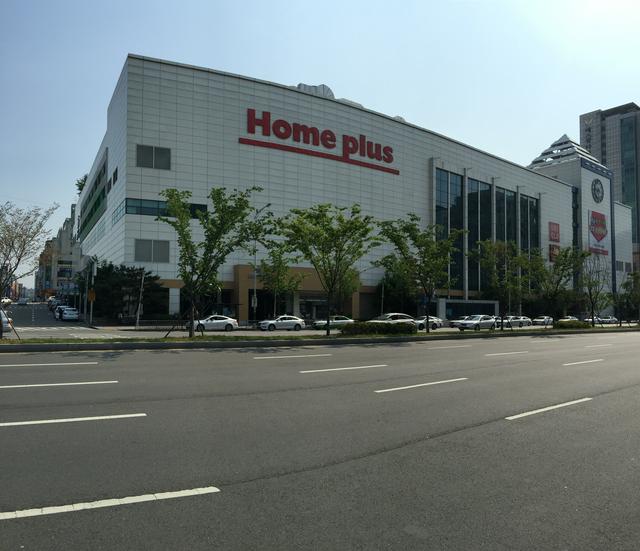
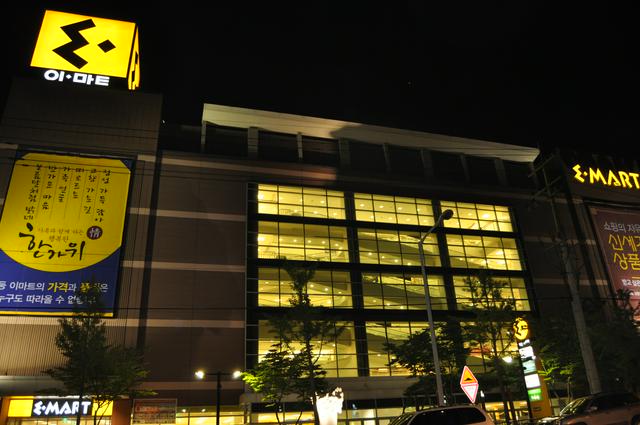
- AK Plaza, Bonghwa-ro 1, Dangye-dong., +82 033-811-5000. 10:30 - 20:00. Opened in 2012, with 5 basement stories and 7 above ground stories.
- Home Plus, chiakro, 1489, Gwanseol-dong, +82 033-769-8700. 09:00 - 24:00. Homeplus (Hangul: 홈플러스) is a Korean discount store retail chain. It is the second largest retailer in South Korea.
- E-Mart, Bukwonro 1928, Musil-dong, +82 033-749-1234. 09:00 - 23:00. e-mart (Hangul: 이마트) is the largest retailer in South Korea. E-mart offers everything from food to clothes to diapers, and provides a very large variety of merchandise.
- Wonju local food store, 438-4, Musildong, +82 033-732-2010. Farm produce from within 50 km of the circumference of the Wonju City, meat, fruit, and other products produced locally.
AK Plaza, Bonghwa-ro 1, Dangye-dong., +82 033-811-5000. 10:30 - 20:00. Opened in 2012, with 5 basement stories and 7 above ground stories.
Home Plus, chiakro, 1489, Gwanseol-dong, +82 033-769-8700. 09:00 - 24:00. Homeplus (Hangul: 홈플러스) is a Korean discount store retail chain. It is the second largest retailer in South Korea.
E-Mart, Bukwonro 1928, Musil-dong, +82 033-749-1234. 09:00 - 23:00. e-mart (Hangul: 이마트) is the largest retailer in South Korea. E-mart offers everything from food to clothes to diapers, and provides a very large variety of merchandise.
Wonju local food store, 438-4, Musildong, +82 033-732-2010. Farm produce from within 50 km of the circumference of the Wonju City, meat, fruit, and other products produced locally.
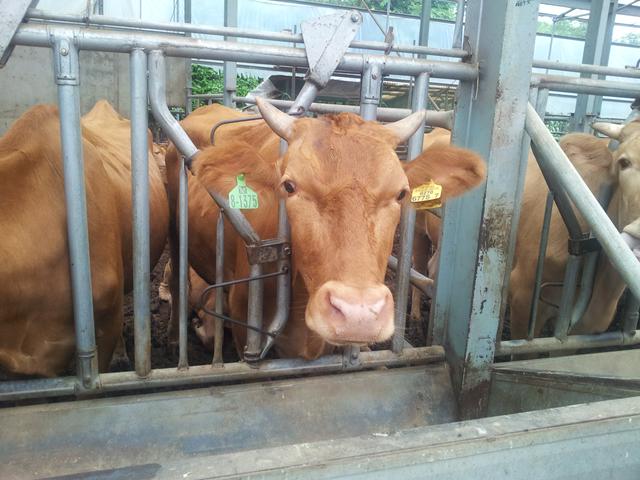 Wonju has the typical Korean restaurants that you'll find in other cities. For Western food, your best bet is the area around Lotte Cinema - you'll find Outback, Family Taco, Irish Potato, a few coffee shops, and a Papa Spaghetti. A McDonald's is also coming to that area. Pizza places (including Pizza Hut and Dominoes) can be found throughout the city. The local E-Mart also houses a McDonald's.
Wonju has the typical Korean restaurants that you'll find in other cities. For Western food, your best bet is the area around Lotte Cinema - you'll find Outback, Family Taco, Irish Potato, a few coffee shops, and a Papa Spaghetti. A McDonald's is also coming to that area. Pizza places (including Pizza Hut and Dominoes) can be found throughout the city. The local E-Mart also houses a McDonald's.
The district of Hoengseong is famous for Hanu, a Korean breed of cattle. The cattle thrive in the clean environment of Hoengseong. Every October, there is a Hanu Festival where visitors can try many foods made with Hanu beef, learn about traditional farming techniques, and engage in several entertaining activities.
